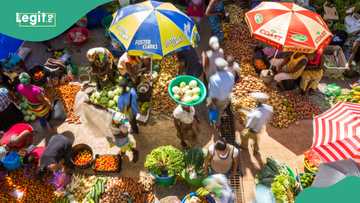Customs Implements Duty-Free Import Of Food Items, Lists Conditions for Companies Interested
- Nigeria Customs has kicked off the implementation of zero import duty and VAT exemption on essential food items
- The policy covers items like maise, beans and rice to address high food prices and improve affordability for Nigerians
- At least 75% of imported items must be sold through recognised commodities exchanges, with all transactions documented
Don't miss out! Join Legit.ng's Sports News channel on WhatsApp now!
Legit.ng journalist Dave Ibemere has over a decade of business journalism experience with in-depth knowledge of the Nigerian economy, stocks, and general market trends.
The Nigeria Customs Service (NCS) has officially begun the implementation of zero per cent import duty and exemption of value-added tax (VAT) on selected basic food items, following a directive from President Bola Ahmed Tinubu.
In a statement released by Abdullahi Maiwada, Chief Superintendent of Customs and National Public Relations Officer for the Comptroller General of Customs, the duty-free policy will remain in force from July 15, 2024, until December 2024.

Source: Getty Images
Nigeria Customs explained that the initiative is part of the government's temporary measure to mitigate current hardships and will focus on addressing the national supply gap.
PAY ATTENTION: Share your outstanding story with our editors! Please reach us through info@corp.legit.ng!
Guidelines for companies to enjoy 0% import duty
Nigeria Customs has released a guideline to achieve the government's objective of reducing food prices in the market.
Details in Customs guidelines are outlined as follows:
Company requirements:
- The company must be incorporated in Nigeria.
- Must have been operational for at least five years.
- Must have filed annual returns and financial statements.
- Must have paid taxes and statutory payroll obligations for the past five years.
Specific requirements for importing certain Items:
For companies husking brown rice, grain sorghum, or millet must:
- The interested company must own a milling plant with a capacity of at least 100 tons per day.
- Operate for a minimum of four years.
- Have sufficient farmland for cultivation.

Read also
“This will go a long way”: FG shares observation after buying more CNG buses from Nigerian company
Regulatory oversight:
- The Federal Ministry of Finance will periodically provide the Nigeria Customs Service (NCS) with a list of importers and their approved quotas.
Sales and Reporting Requirements:
- At least 75% of imported items must be sold through recognised commodities exchanges.
- All transactions and storage must be recorded.
Record keeping:
- Companies must maintain comprehensive records of all related activities.
- The government may request these records for compliance verification.
Penalties for non-compliance:
- Failure to meet import authorisation obligations will result in losing all waivers.
- Companies must pay applicable VAT, levies, and import duties.
- This penalty also applies if the company exports the imported items in their original or processed form outside Nigeria.
Breakdown of the selected food items for free import duty
| Item Description | Previous Duty Rate + Levy now suspended |
| Husked Brown Rice | 30% |
| Grain Sorghum - Other | 5% |
| Millet - Other | 5% |
| Maise - Other | 5% |
| Wheat - Other | 20% |
| Beans | 20% |

Read also
FCCPC identifies those causing increase in prices of rice, yam, other food items, set to take action
CBN slashes Customs FX rate for cargo clearance
Legit.ng earlier reported that the Central Bank of Nigeria (CBN) had slashed the exchange rates for cargo clearance following naira's sustained gains against the dollar in the past seven days.
The Nigerian currency had maintained a momentous gain against the US greenback after a series of interventions by the apex bank.
On Wednesday, August 7, 2024, the apex bank sold Forex to 26 dealer banks via the Retail Dutch Auction System (rDAS).
PAY ATTENTION: Unlock the best of Legit.ng on Pinterest! Subscribe now and get your daily inspiration!
Source: Legit.ng



